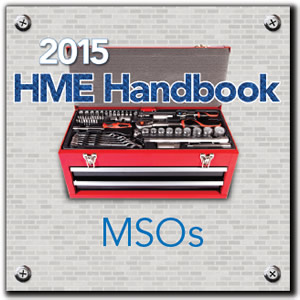2015 HME Handbook
How to Use a Buying Group or MSO Membership to Keep Pace with Market Changes
MSOs offer so much more than group purchasing power; they play a much broader role in the HME industry.

As the saying goes, if there’s one thing that’s constant, it’s change. And providers have seen plenty of change. In fact, they’re becoming experts at change management. However, as adept as providers have become at handling the twists and turns of Medicare reimbursement, audits, demographic shifts and other healthcare upheavals, getting a little help can go a long way.
That’s where buying groups and member service organizations (MSOs) come into play. At their core, MSOs help businesses with limited buying power by banding together with peers to gain volume sales discounts from various vendors. But MSOs offer so much more. HME buying groups and MSOs play a much broader role in the HME industry. With an MSO, a provider can leverage educational services, webinars, conferences, networking opportunities and a multiplicity of other benefits.
Furthermore, MSOs have become highly engaged on the legislative front, working in various industry advocacy capacities to help advance provider and patient agendas to ensure access to quality post-acute care, equipment and supplies are protected. They have also developed special networks to serve needs of specific groups of providers.
Needless to say, MSOs have come a long way from operating as simple buying groups and have evolved into multi-faceted resources for HME businesses. So, how can provider maximize their MSO membership to help them contend with the industry’s constant state of change?
Networking Opportunities
Networking is a key way for providers to share strengths and bets practices, and MSOs offer many networking opportunities as special conferences, conventions and via special groups. The best way to learn new business strategies, operations efficiencies and approaches to managing change is to get them straight from your peers. Most groups opportunities for members to meet with one another in order to share experiences and insights. Moreover, many of these groups also provide electronic networking opportunities, such as listservs and discussion forums. All of these opportunities let you ask your peers questions, evaluate the answers, and apply them to your business.
Special Conferences
Some of the networking opportunities MSOs offer are quite large and essentially count as industry events. Good examples would be The VGM Group’s Heartland Conference, or the MED Group National Rehab Network Summit. These events offer seminar tracks covering a broad variety of topics and attract speakers from across the industry who provide insights and education on the issues of the day.
Targeted Networks
Some MSOs offer special networks within their memberships that are tailored to serve the unique needs of certain groups of providers. Good examples of this would be VGM Group’s Accessible Home Improvement of America or U.S. Rehab, or the MED Group’s National Respiratory Network. These groups collect providers in the same service and product categories and provide concentrated education and services to them. In fact, some of them are dedicated to helping connect providers to new customers, business partners and referral partners. Consider these special networks an MSO on steroids, enabling providers to not only survive change, but to capitalize on change and thrive.
Legislative Engagement
The industry’s MSOs employ a variety of heavily involved legislative experts and staff that work to address key regulatory and legislative challenges for the industry. And, those experts and their teams regularly update MSOs members and provide them resources for getting involved on behalf of their businesses and patients. In addition to keep members updated on key issues, MSOs will organize special calling campaigns, email efforts, and even organize legislative fly-ins to Capitol Hill or state legislatures to lobby on behalf of industry calls. Additionally, these legislative efforts will often coordinate with state industry associations and the American Association for Homecare to concentrate their legislative effectiveness.
Getting Started
To decide on which MSO can help you handle change, but not sure how to proceed, compare and contrast the offerings of each MSO. Things to compare include each groups’ service offerings; the members, staff and culture of the organization; and of course the return on investment. In terms of price, MSOs and buying groups have different prices structures. Some might be flat and others might be tiered by company size. If you’re unsure of which organization is right for your business, you might be able to give some of them a trial run. Some groups require no term commitments for membership, so that if a provider doesn’t like a group’s member services after all, it can end its membership. Joining an MSO or buying group is a relatively simple process with most just requiring a provider to fill out an application. The application is quickly reviewed by the group, which then gets back to the provider with any further questions.
Points to Take Away:
- Change has become an industry constant, but member service organizations (MSOs) can offer providers a variety of resource for dealing with it.
- One of those resources are special meetings, conferences and educational events, and some of these conferences have grown so large that they have become industry-wide conferences.
- MSOs also offer special networking opportunities to help providers of specific types meet and share best practices.
- MSOs are also heavily engaged in terms of industry advocacy and legislative efforts, which can help providers not only manage, but control the major regulatory changes that impact them.
Learn More:
Here are links for some key HME industry member service organizations:
This article originally appeared in the June 2015 issue of HME Business.